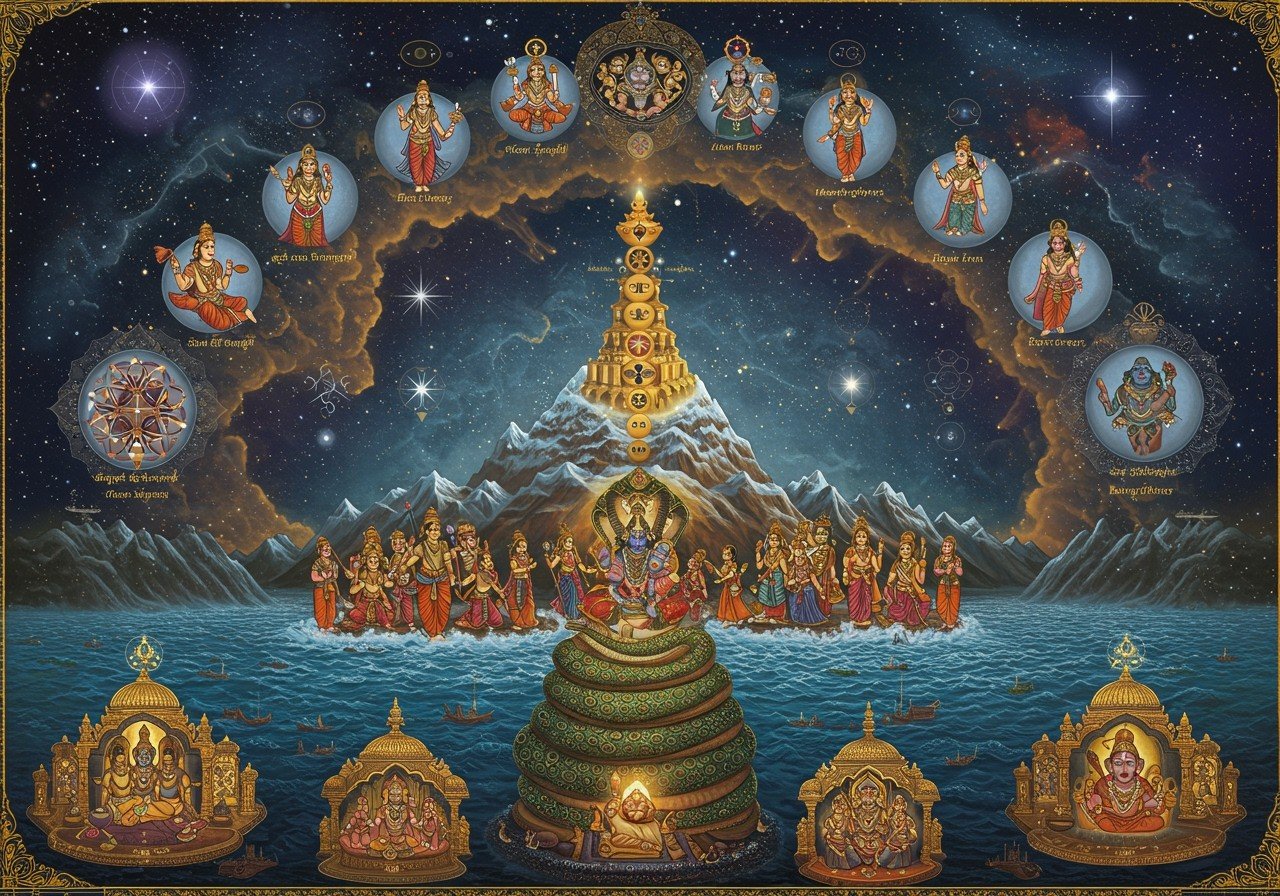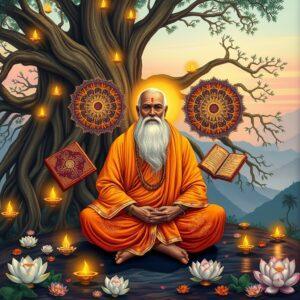
The Vedas, ancient sacred texts, form the foundation of Hindu philosophy and cosmology. These texts offer profound insights into the universe’s origin, structure, and functioning. Understanding Vedic cosmology and philosophy helps us appreciate the rich cultural heritage and spiritual wisdom of India.
Understanding Vedic Cosmology
Vedic Cosmology Explained
Vedic cosmology studies the universe’s origin, structure, and purpose. It describes the universe as a vast, cyclical system, highlighting the interconnectedness of all beings. Time is divided into yugas (ages), and each yuga cycles through creation and destruction. This cosmology includes the concept of a spiritual universe beyond the mundane one, where Vishnu is recognized as the supreme source. The universe is described as comprising three primary realms: Swarga (heaven), Prithvi (earth), and a spiritual realm called Vaikuntha.
Key deities in Vedic cosmology include:
- Brahma: The creator, responsible for bringing the universe into existence.
- Vishnu: The preserver, maintaining the cosmic order and balance within the universe.
- Shiva: The destroyer, representing the cyclical nature of time and the universe’s eventual dissolution.
The concept of the multiverse is significant, with many parallel universes existing simultaneously. The Purusha Sukta hymn from the Rigveda describes Purusha, the cosmic being, whose body forms the universe. Another vital concept is the cosmic egg (Hiranyagarbha), from which creation emerges.
The five elements (Pancha Mahabhutas) – earth, water, fire, air, and ether – are fundamental in Vedic cosmology. The four Vedas (Rigveda, Yajurveda, Samaveda, Atharvaveda) disseminate this knowledge. These texts offer profound insights into the workings of the universe and the interconnectedness of all things.
Philosophical Foundations of the Vedas
Core Principles of Vedic Philosophy
Vedic philosophy includes concepts like:
- Dharma: Righteous duty, guiding individuals towards ethical and moral conduct.
- Karma: Action and its consequences, shaping future experiences and influencing the cycle of rebirth.
- Moksha: Liberation from the cycle of rebirth, achieved through spiritual understanding and self-realization.
The Upanishads, which conclude the Vedas, explore themes like Brahman (ultimate reality) and Atman (individual soul). They discuss Maya (illusion) and the nature of reality. The four aims of life (Purusharthas) – Dharma, Artha (wealth), Kama (pleasure), and Moksha – guide ethical living and personal fulfillment.
The eternal soul (Jivatman) journeys through lifetimes (Samsara). Meditation (Dhyana) and self-realization (Atmajnana) are essential for spiritual enlightenment. Six orthodox schools of Hindu philosophy (Nyaya, Vaisheshika, Samkhya, Yoga, Mimamsa, Vedanta) interpret these teachings, offering various perspectives on the nature of reality and the path to liberation.
Vedic Perspective on the Shape of the Earth
Ancient Views on Earth’s Shape
The Vedas describe Earth using symbolic language and imagery. These descriptions reflect deeper philosophical and spiritual insights rather than literal scientific assertions. The symbolic representation showcases the interconnectedness of all beings in the universe.
Impact of Vedic Cosmology and Philosophy on Indian Culture
Enduring Influence
Vedic cosmology and philosophy profoundly impact Indian culture and spirituality. Concepts from these ancient texts influence Hindu rituals, festivals, and temple architecture. The moral framework of Indian society draws from Dharma and Karma principles, guiding individuals towards ethical behavior and social responsibility. Vedic philosophy shapes Indian arts, literature, and classical music, inspiring creativity and artistic expression. Practices like Yoga and Ayurveda emphasize holistic well-being and spiritual growth, promoting physical and mental health.
Institutions preserving Vedic knowledge play a crucial role in promoting this ancient wisdom. Notable scholars contribute to interpreting and spreading Vedic teachings globally. The global impact extends to comparative religion and philosophy fields. Vedic teachings address contemporary existential questions, offering timeless wisdom for ethical dilemmas.
Poojn.in: Your Source for Vedic Study and Practice
Poojn.in offers a wide selection of products to support your exploration of Vedic cosmology and philosophy. Enhance your understanding and practice with our curated collection:
- Unlock the Power of the Gayatri Mantra: Explore the significance of this powerful mantra with our informative blog post and related products.
- Sacred Items for Puja: Find high-quality puja items like paddy seeds and more to enhance your spiritual practice.
- Mangalam Camphor Powder: Create a sacred atmosphere during your rituals with pure camphor powder.
Visit Poojn.in to discover a wide range of authentic products for your spiritual journey. We offer secure packaging and delivery across India.
Conclusion
Exploring Vedic cosmology and philosophy offers profound insights into the universe and life’s deeper meanings. The rich traditions and teachings of the Vedas continue to influence Indian culture and spirituality. By understanding these ancient texts, we connect with our heritage and gain wisdom that guides us in our everyday lives. The principles of Dharma, Karma, and Moksha remind us of our duties, actions, and the ultimate goal of liberation. The cyclical nature of the universe and the interconnectedness of all beings inspire a sense of harmony and balance. Embracing these teachings enriches our lives and helps us navigate the complexities of modern existence. As we honor the wisdom of the Vedas, we preserve our cultural legacy and find answers to timeless questions. This journey through Vedic cosmology and philosophy is not just an exploration of the past, but a path to a more meaningful and enlightened future.


